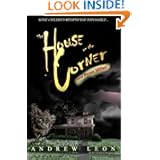But to the extent that you (or I) thought that was a modern thing -- extending Christmas to encompass whatever it is we want it to mean, whether that be buying the wife a new car or buying the wife a new bracelet -- here are some old interpretations of Christmas that show Christmas is Everything To Everyone isn't exactly a Madison Avenue creation.
Consider, for example, that Christmas might mean only about 33 more years of lying bound, waiting to go to Heaven -- and while 33 years seems like a long time, it's relatively short compared to the 4,000 years that went before it, as told in the old Christmas song Adam Lay YBounden:
Adam Lay Ybounden's first verse goes like this, in case you had trouble following it:
Adam lay ybounden,
Bounden in a bond;
Four thousand winter
Thought he not too long.
And all was for an apple,
An apple that he took,
As clerkës finden written
In their book.
Nor had one apple taken been,
The apple taken been,
Then had never Our Lady
A-been heaven's queen.
Blessed be the time
That apple taken was.
Therefore we may singen
Deo gratias!
The story being this: Adam ate the apple and thereafter had to stay bound from Heaven until Jesus was crucified for our sins, that being the story in the Middle Ages. So the song, which doesn't sound upbeat, really is, in that in the second and third verses, Adam's story unfolds and by the end his redemption is only a few decades away, which is about a jillion times more of a happy ending than Clark Griswold getting enough of a bonus to put in that swimming pool.
Not a lot of families sit around the Spinet and sing Adam Lay YBounden, I bet: It's a song included in the First of the Nine Lessons, a form of Christmas service that isn't seen much these days, but which is broadcast every year on Christmas Eve from King's College -- giving some stiff competition to TBS' annual marathon of A Christmas Story.
If you're uncomfortable gathering the kids around the Tree of Knowledge of Good And Evil and singing about a man being bound for 4,000 years, well, get over it, or else maybe move on to a more modern interpretation of Christmas, and by "more modern" I mean "over 100 years ago," and by "interpretation of Christmas" I mean "actually, it was Thanksgiving," by which I mean to say Jingle Bells was originally a Thanksgiving song.
It's common, nowadays, to moan and groan about "Christmas creep" and complain that Christmas trees appear in the stores before the Halloween candy has even been eaten, but have you considered that maybe you're not eating it fast enough? Lord knows, I'm trying, but I'm just one person.
And have you considered that maybe Christmas Creep is also not a modern thing, since, as I mentioned, it's been going on for over a hundred years and began, more or less, with the co-opting of Jingle Bells by Christmas away from Thanksgiving.
In fact, Jingle Bells isn't even really called Jingle Bells, and the name isn't just wrong, it's also misleading, in that Jingle Bells weren't meant to be festive: they were meant to warn you away from certain doom.
Let's explain: Jingle Bells was written, depending on who you talk to, by a rebellious loner who wanted to buck tradition, or a "complete loser," as its author, James Pierpont, was once described.
Pierpont wrote Jingle Bells at a tavern, "in the presence of Mrs. Otis Waterman," according to the plaque commemorating the occasion, in 1850, and it's important that Mrs. Otis, whose place in history is assured except that nobody knows about her, was there because there's actually some dispute about that version of events because while Medford, the place where the tavern and Mrs. Otis were, claims to be the birthplace of the song, Pierpont didn't actually publish it until 1857, when he lived in Savannah, Georgia, and he published it under the title One Horse Open Sleigh.
Pierpont's inspiration for the song was the sleigh races that were popular in Medford at the time, and the words Jingle Bells is not so much descriptive as it is imperative, according to Wikipedia, which says that the bells were put on sleighs to help warn people that the vehicles were coming. That makes the song less of a traditional carol and more of an 1850s version of Little Deuce Coupe or Hot Rod Lincoln.
Pierpont not only didn't set out to write a popular Christmas song, but he didn't even write the song: he stole the music from a French (!) song, Vive Le Vent:
Here are the lyrics to Vive Le Vent:
The long road
All white snow white
An old man walks
With his cane in hand
And up there the wind
Whistling in the branches
Whispers romance
He sang a little child:
{Refrain:}
Jingle Bells, strong wind
Jingle Bells Winter
Who goes whistling, blowing
In large green pines ...
Oh! Live time live time
Long live the winter weather
Snowball and New Year's Day
Happy New Year and grandmother ...
Merry, merry Christmas
A thousand candles
When singing to the sky
The bells of the night,
Oh! Jingle Bells, strong wind
Jingle Bells Winter
Which refers to the old children
Their memories of yesterday ...
And the old man
Down to the village,
This is the time where everything is wise
And shadow dance by the fireside
But in every home
It floats on a festive air
Around the table is ready
And we hear the same song:
{au Refrain}
Snowball and New Year's Day
Happy New Year and grandmother!
Jingle Bells Winter!
So this year, why not sing that song with an exaggerated French accent, and think about how Obama has socialized even our Christmas carols?
If it's any consolation, Medford is also the birthplace of the woman who wrote the poem that became "Over The River And Through The Woods," but you're right: that's no consolation.
Say, as long as we're talking about how Obama turned Christmas into socialism from Kenya, why not mention how Christmas got totally politicized back in the day, the "day" being 1977 when the not-cashing-in-at-all play "Annie Warbucks" was written as the second attempt at a sequel to the hit play "Annie."
(The first attempt was Annie 2: Electric Boogaloo.)
"Annie Warbucks", according to Wikipedia, had this plot:
On Christmas morning in 1933, when Child Welfare Commissioner Harriet Doyle (replacing the original's Miss Hannigan as the villain of the piece) arrives on the scene to informDaddy Warbucks he must marry within sixty days or else the child will be returned to theorphanage. Daddy Warbucks' whirlwind search for a fitting bride uncovers not only a plot by Doyle and her daughter Sheila Kelly to strip him of his fortune, but also his true feelings for his long-time assistant, Grace Farrell. A gaggle of cute little girls seeking parents and President Franklin D. Roosevelt return to take part in the shenanigans.
Which, somehow, translated into setting an off-Broadway record for box office performances, but plans to move the play to Broadway were scuttled by, seriously, cold weather: producers said that cold weather was slowing down ticket sales and so they didn't bother moving the play to Broadway because theater-goers apparently do not know that most Broadway plays are actually put on indoors.
In Annie Warbucks, not just FDR and a gaggle of girls returned, but the hit (?) song "A New Deal For Christmas" was reprised, as FDR and people sang in the original about the glories of overturning Lochner-era rulings and allowing Congress to run rampant with the regulations:
Remember when Christmas wasn't all commercial like it is now, and instead was all about government agencies handing money to people? The lyrics to that song include:
On Farley and Perkins
On Ikes and Wallace
On Monganthau and Cummings.
Fill our pockets with dollars!
Farley, you might want to know, was a Democratic boss who revolutionized the way polling was used in elections and helped build the New Deal while also being the first politician to normalize relations with the Vatican. Perkins was FDR's Secretary of Labor, and Wallace was the Secretary of Agriculture, a position you don't ordinarily associate with either Christmas or power, but in Wallace's case, it helps to know that he ordered the slaughtering of pigs to help drive up the price of commodities.
Oh, Christmas memories! It's amazing to me how few of our modern celebrations take note of the slaughter of pigs to drive up prices. It's like the holiday doesn't mean anything any more.



































